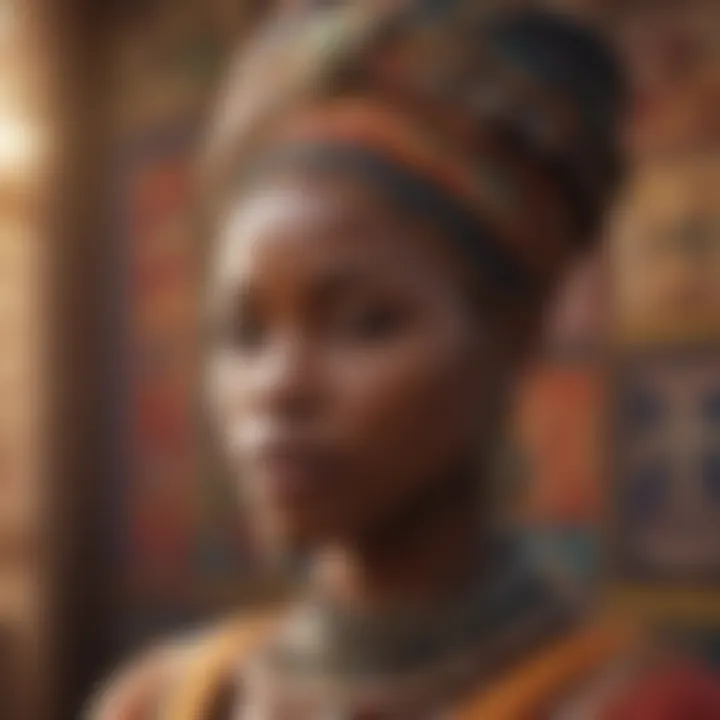Exploring African Lineage: Heritage and Identity


Intro
Exploring the fabric of African lineage reveals intricate patterns woven through history, culture, and identity. This study aims to unravel those patterns, shedding light on the significant influences these lineages have had on global cultures and today's perception of identity and ancestry. The theme resonates with many who wish to trace their roots back to a time when cultures flourished independently before the tide of colonization swept across the continent.
The significance of delving into African heritage cannot be underestimated. With the persistence of social dynamics and discussions surrounding identity, understanding one’s lineage fosters a greater sense of belonging and awareness. Therefore, we embark on this journey to understand African lineage from various perspectives—anthropologically, sociologically, and genetically—while tracing historical migration patterns and their subsequent repercussions on modern identity.
Research Highlights
Overview of Key Findings
Understanding African lineage is akin to peeling an onion; each layer reveals deeper complexity. One key finding is the role historical migration patterns play in shaping current societal structures and identities. For instance, genetic studies have shown that movements like the Bantu Expansion had profound effects not just on populations within Africa, but also on those who would encounter these migratory peoples, leading to rich exchanges of culture and technology.
Another significant point is the impact of colonization on the perception of African ancestry. Many colonial narratives sought to erase or marginalize indigenous cultures. The misunderstandings rooted in these narratives have persisted in contemporary discussions of identity. Therefore, examining these historical contexts allows us to appreciate the resilience of African societies and celebrates their contributions to global civilization.
"History is not just the past; it's a lens through which the present is filtered, revealing both triumphs and tribulations."
Significance of the Research
This research holds substantial importance for various audiences: students seeking to understand their heritage, educators wishing to inspire curiosity in young minds, and professionals engaged in fields like anthropology, sociology, or genetics. Surveying African lineage elucidates the factors shaping modern identities and contributes to discussions around social dynamics.
By analyzing lineage within Africa, we also highlight the ongoing challenges that descendants face when trying to recognize and honor their roots—a challenge compounded by the shadows of colonization. The findings can nurture an appreciation for the complexities surrounding identity, tying back to the importance of celebrating one’s heritage without oversimplifying the narratives that shape it.
Original Research Articles
Summary of the Article
The examination of African lineage encapsulated in this article is multidimensional, drawing upon anthropological, sociological, and genetic perspectives. It employs a holistic approach that embraces the diversity of experiences within the African context. The research highlights pivotal historical migrations and cultural exchanges while addressing the detrimental impacts of colonial histories.
Author Contributions
This work has been a collaborative effort, combining insights from experts in anthropology, sociology, and genetics. Each author brought their own unique perspective and expertise, enriching the narrative and broadening the applicability of the findings. By synthesizing their collective knowledge, we strive to present an accurate portrayal of African lineage that resonates with educational and professional audiences alike.
Prelims to African Lineage
Understanding African lineage is like embarking on a journey through a sprawling, intricate tapestry woven over millennia. This topic is vital because it provides not just a glimpse into the past but also a roadmap for how identity, culture, and social dynamics form in the present and shape the future. A comprehensive overview of African lineage delves into the unique histories, cultural practices, and genetic variations that reflect the vastness of the continent's human experience.
Definition and Scope
When we talk about African lineage, we’re addressing the roots and branches of families and ethnic groups scattered across diverse terrains—from the Sahara to the Serengeti. African lineage definition extends beyond merely tracing family trees. It encompasses the stories, values, and traditions that define communities.
The scope is colossal, involving:
- Anthropological studies: Exploring how human behavior and cultures evolved.
- Genealogical research: Understanding familial connections and heritage.
- Cultural analysis: Examining arts, music, and oral histories that distinguish various groups.
This multifaceted approach offers invaluable insights into not just who people are today, but why they are that way. There’s a rich interplay of local customs and global influences that continually shapes identity.
Cultural Significance
Cultural significance of African lineage cannot be overstated. It plays a crucial role in how individuals perceive themselves and their place in the world. In many African societies, lineage determines social structure, inheritance, and responsibilities. For instance, among the Zulu, seniority and lineage often dictate leadership roles within the community, influencing decisions that affect everyone.
The connectedness that comes from understanding lineage contributes to:
- Community cohesion: Strengthening ties among members through shared narratives and heritage.
- Cultural preservation: Encouraging the passing down of traditions and languages that might otherwise fade away.
- Identity formation: Helping individuals find a sense of belonging in an increasingly globalized world.
"Knowing one’s roots is more than just a matter of pride. It knits the fabric of community, revealing connections that span generations."
The exploration of African lineage encourages us to appreciate the complexity of heritage in a modern context, nurturing a consciousness that seeks to celebrate differences while promoting unity.
Historical Context
Examining the historical context of African lineage is akin to peeling back the layers of an onion. Each layer reveals a unique story, illuminating the diverse experiences, challenges, and triumphs that shaped African identity over centuries. Understanding this context is crucial, as it gives depth to the genealogical ties that connect individuals today, while also highlighting the complexities of heritage influenced by various social, political, and economic factors.


Pre-colonial Societies
Before colonization, African societies were rich with diversity and complexity. Different tribes and communities flourished, each with their own distinct languages, traditions, and social structures. For instance, the Zulu of Southern Africa built powerful kingdoms, while the Ashanti in West Africa developed advanced governance systems characterized by a strong centralized leadership. These societies adhered to intricate belief systems, often intertwined with their understanding of ancestry and lineage.
Family structures varied widely—some operated on matrilineal lines, where lineage traced through mothers, such as with the Akan people, while others followed patrilineal systems, noting descent through fathers, common among the Maasai in East Africa.
Many of these societies placed a heavy emphasis on oral traditions. Ancestral stories passed down through generations emphasized the importance of kinship, making clear that lineage was more than just blood ties; it involved social responsibilities, cultural preservation, and community cohesion. The role of elders was pivotal in these societies, as custodians of history and customs.
Colonial Impacts
The arrival of European powers drastically altered the landscape of African lineage. Colonization brought about forced migrations, disrupted age-old customs, and imposed foreign rule. For instance, the Berlin Conference of 1884 allowed European powers to carve up Africa without any regard for existing tribal boundaries, leading to long-lasting conflicts.
Colonial rule often aimed to erase traditional practices in favor of European customs, undermining the cultural systems that had been foundational to various African communities. The introduction of foreign education systems and religions created significant shifts, resulting in the erosion of local languages and customs. As colonial powers sought to control populations, they often distorted family structures and kinship ties, relegating indigenous identities to the background.
"Colonial influences not only disrupted the continuity of lineage but also fostered challenges in understanding one's heritage in post-colonial contexts."
Post-colonial Realities
In the wake of colonization, African countries embarked on the journey of nation-building, wrestling with a complex legacy of divided societies and fractured lineages. Independence brought hopes for reclaiming cultural identities and reviving ancestral ties; however, the transition was often marred by lingering effects of colonialism, such as economic dependency, social dislocation, and ethnic conflicts.
Post-colonial societies have had to grapple with the decolonization of identities. As nations emerged, the need to acknowledge and honor diverse lineages became paramount. This period saw the rise of cultural movements aimed at reclaiming lost heritage and addressing historical grievances.
However, the challenges remain. Globalization further complicates issues of identity, as many individuals of African descent navigate the dichotomy of embracing their roots while adapting to modern influences. The search for identity becomes a delicate balancing act—honoring the past while striving to create a future that respects and celebrates individual and collective histories.
Understanding the historical context offers a nuanced lens through which to view contemporary African identities. By illuminating the journeys and disruptions faced by African societies, it becomes evident that lineage is not a mere reflection of blood but a tapestry of culture, history, and resilience.
Anthropological Insights
The study of anthropological insights serves as a vital pillar in understanding African lineage. This section delves into specific elements that showcase the intricate weave of culture, identity, and history. By examining the patterns of migration, family structures, and the significant rituals and traditions, we unravel the profound depths of heritage that shape contemporary understanding of identity in African societies.
Migration Patterns and Tribal Lineage
The patterns of migration across Africa, whether forced or voluntary, have had a substantial impact on tribal lineage. Over centuries, communities moved about for various reasons, be it searching for fertile land, escaping conflict, or trading opportunities. These migrations not only led to the formation of distinct tribal identities but also reinforced the ties within and between communities.
For instance, the Bantu migrations, which began around 2000 BCE, spread a diverse array of languages and cultures throughout sub-Saharan Africa. As people relocated, they brought with them their social structures and beliefs, fostering a rich tapestry of linguistic diversity and cultural practices.
"Understanding these migrations enables a clearer picture of how communities intermix and influence one another, a phenomenon that is far from static."
Furthermore, tribal lineage often carries deep meanings concerning leadership and governance. Many tribes trace their lineage back to foundational ancestors, reinforcing collective identities and cultural narratives. Through oral history, older generations transmit stories that not only define kinship but also instill values and social norms within younger members.
Family Structures
Family structures in African lineage reflect both flexibility and resilience. Unlike the traditional nuclear family model prominent in many Western societies, African families often incorporate extended family members. Grandparents, aunts, uncles, and cousins frequently live in close proximity or within the same household, creating a network of support that extends beyond the immediate family.
For example, in many West African cultures, the concept of "family" transcends mere biological ties, enveloping a larger community network. Raising children is viewed as a collective responsibility, where everyone plays an active role in nurturing the next generation. Such structures not only provide economic support but also enhance cultural continuity, as customs and traditions are passed down through communal participation.
Rituals and Traditions
Rituals and traditions represent the heart and soul of African societies, offering insight into cultural values and community ties. These practices—ranging from birth celebrations to funerals—carry profound meaning and serve as essential markers of identity. They uphold familial bonds and provide avenues for individual expression within the larger context of the community.
Take, for instance, the elaborate rituals associated with the rites of passage, such as the Maasai initiation ceremonies. These celebrations signify a crucial transition in a young person's life and are characterized by vibrant cultural expressions, from music and dance to intricate beadwork. They not only affirm individual identity but also reinforce communal ties.
In summary, anthropological insights expose the multifaceted nature of African lineage. By exploring migration patterns, family structures, and rich rituals, we gain a deeper appreciation of how identity is constructed and maintained across generations.
Genetic Perspectives
The examination of genetic perspectives is crucial in understanding African lineage, as it intertwines the threads of ancestry, health, and identity. Genetic markers serve as a map, guiding researchers and enthusiasts alike through the complex landscape of Africa's lineage history. Not only does this field of study enhance our grasp of heritage, but it also extends to contemporary societal implications, such as health predispositions and identity formation within the diaspora. Thus, comprehending genetic perspectives allows for a richer appreciation of how lineages have shaped communities throughout history.
Genetic Diversity in Africa
Africa is known for its remarkable genetic diversity, often referred to as the cradle of humankind. This diversity springs from a long history of migration and adaptation, which has resulted in varied genetic traits across populations. The more one looks into various regions such as the Bantu migrations or the Berber people of North Africa, the clearer this picture becomes.
- Haplotype Variation: Studies reveal that the variations in haplotypes can indicate how groups moved or settled in new areas. For instance, specific haplotypes among the Yoruba in Nigeria highlight centuries of local agricultural developments and interactions with neighboring cultures.
- Cultural Impact: Genetic markers also reflect cultural evolutions. The presence of certain alleles could imply shared ancestry or alliances formed between tribes. These markers are not just mere indicators of genetic drift; they narrate a comprehensive story of inter-tribal relations, conflicts, and convergences.


This genetic tapestry not only highlights human resilience but emphasizes Africa's pivotal role in the broader narrative of human evolution.
Ancestry Testing and Its Implications
Ancestry testing has gained popularity in recent years, with increased accessibility to various testing kits from companies like 23andMe or AncestryDNA. These tests offer insights into lineage, shedding light on individual histories and familial roots.
However, as one peels back the layers of ancestry testing, it's important to consider the implications:
- Reconnecting with Heritage: Many individuals, especially in the diaspora, find that ancestry tests can act as a bridge back to their roots. The results often prompt an emotional reconnection with cultural practices and traditions that have long been forgotten.
- Ethical Concerns: Despite the benefits, ethical concerns arise regarding data privacy and the potential misuse of sensitive information. Conversations continue around who has the right to ancestral narratives, especially when these stories intersect with commercial interests.
Ancestry testing, therefore, is not just about personal discovery; it opens a discussion on broader societal and ethical considerations, often highlighting the disparities and inequities within genetic research.
Health and Genetic Disorders
Understanding genetic disorders within the African context is essential for addressing healthcare disparities that affect various populations. Genetic predispositions to certain health conditions are often influenced by ancestral backgrounds. For instance, the sickle cell trait holds a high prevalence in certain African populations due to the adaptive advantages it conferred against malaria.
- Prevalence of Disorders: Conditions like thalassemia and various forms of inherited metabolic disorders have significant implications in communities where they are common. By studying these conditions, researchers can better understand how genetics informs public health strategies targeted at high-risk populations.
- Access to Care: The challenge remains regarding access to genetic counseling and testing in many African countries, which hampers the ability of families to understand and manage these health risks adequately.
Working toward a better understanding of health-related genetic factors supports not only the individual but strengthens communities by promoting informed healthcare choices and increasing access to necessary resources.
"Understanding our genetic past can forge a better path forward; each genetic thread links us not only to our ancestry but also our shared responsibilities in health management and cultural preservation."
Thus, genetic perspectives not only foster an appreciation for history and culture, but they also catalyze current conversations essential for improving health outcomes in African populations.
Sociocultural Dynamics
The exploration of sociocultural dynamics is essential in understanding the multifaceted nature of African lineage. This topic encompasses how culture and society intersect with individual and collective identities. In the current global landscape, it sheds light on the struggles and triumphs of African descendants worldwide. Specifically, focusing on identity issues, integration into diverse diasporas, and the revival of cultural heritage illustrates the ongoing discourse about what it means to belong and to reclaim one's roots.
Contemporary Identity Issues
Contemporary identity issues within the African context are as varied as the cultures that compose it. From internal conflicts about ethnic identity to the pressures of assimilation in Western societies, many individuals grapple with a sense of belonging. Children of African immigrants, for instance, often walk a fine line between their parents' traditions and the modern values of their new environments. They may encounter challenges such as:
- Acculturation Stress: Struggling to fit into both their heritage culture and the dominant culture.
- Stereotyping: Facing preconceived notions about their identity in both societal and institutional contexts.
- Cultural Displacement: Feeling disconnected from both their parents' roots and the mainstream culture.
As those individuals navigate these complex waters, the quest for authentic self-expression becomes paramount. Often, this leads to a deeper exploration of their lineage and the necessity to embrace a multifaceted identity that reflects both their ancestral heritage and contemporary realities.
Integration and Identity within Global Diasporas
In discussing integration, it’s important to highlight how African descendants in global diasporas navigate their identities. Whether in London, New York, or Johannesburg, these communities are characterized by a blend of traditions, languages, and practices that echo their ancestral roots while adapting to new environments. Integration often results in a rich tapestry of cultural exchange, promoting:
- Celebration of Diversity: Where different customs are shared, leading to innovative cultural expressions.
- Network Building: Social ties across various backgrounds that strengthen community bonds and support systems.
- Intersectionality Awareness: A better understanding of how various identities (race, ethnicity, gender) coalesce in unique experiences.
This intricate mixing does not come without hurdles. Issues like racism, exclusion, and discrimination still plague many individuals seeking to create a sense of place within these communities. To responsibly address these challenges is crucial, as they often lead to feelings of disenfranchisement among those who struggle to assert their identity within various layers of society.
Cultural Revivals and Reclamation
Cultural revivals and reclamation are powerful forces shaping contemporary sociocultural dynamics. Across the globe, as individuals reconnect with their heritage, we see movements aimed at revitalizing languages, art forms, and traditions that were at risk of being lost. The importance of these efforts cannot be overstated; they often become a source of both personal pride and communal empowerment. Key aspects include:
- Language Reclamation: Initiatives focusing on teaching and preserving indigenous languages among the youth, fostering a stronger connection to their roots.
- Traditional Arts and Crafts: Reviving artistic practices that showcase the richness of African history and creativity.
- Cultural Festivals: Organized events that not only celebrate heritage but also serve to educate others about the depth and breadth of African cultures.
"Cultural revival is not just about nostalgia; it’s about positioning ourselves within a global narrative that recognizes our worth and contributions."
Overall, the movement for cultural revival demonstrates a collective realization that to fully embrace one's identity, it is critical to know and celebrate where one comes from. Such activities serve not just to preserve a past, but to enrich the present and inform the future of generations to come.
Impact of Technology on Heritage
In the fast-paced world we live in today, understanding the influence of technology on heritage and lineage is critical. Technology acts as a double-edged sword; it has the capacity to both obscure and illuminate the vast histories that define African identity. This section examines how modern technological advancements are reshaping our perceptions and connections to African heritage, stressing both the merits and pitfalls that come along with it.
Digital Archives and Preservation
The advent of digital technology has revolutionized how historical records and cultural legacies are stored, accessed, and appreciated. Digital archives serve as treasure troves of ancestral knowledge. They provide unprecedented access to documents, oral histories, photographs, and videos that might have otherwise remained hidden away or lost altogether. Researchers can now unearth primary sources from the comfort of their homes, far away from the artifacts and records that reside in distant archives.


"Digital preservation is not just about keeping things, it's about making the past relevant for the future."
However, while the benefits are significant, there are considerations to keep in mind. Digital platforms can sometimes lack the rich context that physical objects provide. An online image of a historical artifact can never replicate the tactile experience of holding it. Furthermore, the sheer volume of information online can overwhelm those untrained in distinguishing credible sources from spurious ones. It begs the question: are we witnessing the democratization of historical knowledge or merely the dilution of its authenticity?
A few examples illustrate this point:
- The African Heritage Digital Archive Project: This initiative focuses on digitizing materials related to Africa's cultural and historical narratives, ensuring that these stories are preserved for future generations.
- The Internet Archive: A massive repository that provides access to books, audio recordings, and videos, allowing individuals to explore African heritage in a more immersive way.
Social Media and Cultural Sharing
Social media has become a modern campfire where stories are shared, identities are forged, and cultures collide. Platforms like Facebook, Instagram, and Twitter have opened up avenues for individuals to express their cultural heritage and engage with global audiences. This ability to connect presents a significant opportunity for people of African descent to reclaim and celebrate their lineage, often prompting discussions that transcend geographical boundaries.
On the flip side, the fast-paced nature of social media can sometimes reduce complex histories to mere snippets or oversimplified narratives. Cultural appropriation has also arisen as a pressing concern, where aspects of African cultures may be misrepresented or commodified without proper acknowledgment or respect. This highlights the delicate balance that must be maintained in a digital space where visibility often overshadows authenticity.
Through targeted campaigns, grassroots initiatives, or simply hashtag movements, social media has proven to be a powerful tool. Here are some notable patterns:
- Cultural Revitalization: Many groups have used platforms to share traditional practices, languages, and arts, thus fostering a sense of community.
- Amplifying Voices: Individuals can share personal narratives tied to their heritage, reaching others who resonate with their experiences.
- Content Creation: Influencers and everyday users alike create content that brings African heritage to life, engaging younger generations in ways that traditional education often does not.
Challenges and Opportunities
Challenges in Heritage Recognition
In a world that often underestimates the importance of history, challenges to heritage recognition stand tall like a mountain. The first hurdle is visibility. Many African lineages and cultural identities have become obscured through generations. This stems from a variety of factors, including the historical complexities of colonialism and globalization. Many communities find it difficult to trace their roots due to a lack of documented history, leading to a disconnection from their ancestry.
Additionally, the mainstream narrative rarely includes these rich histories, and when discussed, they can often be overshadowed by more dominant cultural presences. This brings about another challenge: the competition for identity. How does one reclaim their heritage against a backdrop of globalization where cultures are often homogenized?
Factors such as socio-economic status also pose significant barriers. Those from marginalized communities may lack the resources to conduct genealogical research or participate in cultural events. In many cases, the financial investment required for DNA testing or extensive archival research can be daunting.
- Visibility: Many lineages remain unknown or neglected.
- Cultural Homogenization: Dominant narratives can eclipse local histories.
- Resource Limitations: Financial constraints affect the ability to trace lineage.
These challenges can lead to feelings of loss and frustration among descendants attempting to reconnect with their cultural heritage. However, examination of these obstacles can aid in designing more effective pathways for recognition in the future.
"We must first understand where we come from to know where we are headed."
Opportunities for Collaboration and Research
On the other hand, alongside these challenges lie numerous opportunities, ripe for exploration and innovation. As interest in African lineage grows, so does the number of platforms available for collaborative efforts. Academic institutions, cultural organizations, and community groups are increasingly forming partnerships to promote heritage preservation and awareness.
The advent of technology has opened doors that were previously closed. For example, crowdsourced genealogical projects have emerged, enabling communities to collectively compile histories and lineages. Local universities, researchers, and community historians can work together to conduct studies, share findings, and even digitize records. This collaborative approach makes heritage work more inclusive and community-driven.
Moreover, interdisciplinary research provides fertile ground for rich analysis. Scholars from diverse fields—anthropology, history, genetics, and sociology—can contribute their expertise to create a holistic understanding of African lineage. Collaborative research initiatives can help to establish recognized standards for genealogical documentation, ensuring that essential histories are preserved.
As we look ahead, collaboration can also take tangible forms in the way of conferences, workshops, and public forums. Such gatherings allow for sharing knowledge and experiences, ultimately fostering a sense of community among those navigating similar journeys.
Key Opportunities Include:
- Collaborative Projects
- Interdisciplinary Research
- Community Engagement Initiatives
Embracing these opportunities promotes not only heritage recognition but also helps individuals reclaim their narratives and contribute positively towards a broader understanding of African lineage in today's world.
Closure
The exploration of African lineage is not just an academic exercise; it has profound implications for identity, culture, and the human experience as a whole. The conclusions drawn within this study highlight the importance of recognizing how historical, sociocultural, and genetic factors intertwine to shape our understanding of ancestry. In a world where globalization often blurs the lines of individual heritage, rediscovering African roots provides a pathway to reclaim and celebrate one’s identity.
Summary of Key Findings
This study has synthesized a broad array of insights into African lineage, revealing several key findings:
- Historical Migrations: The article underscored the significant migration patterns that characterize the African continent. The movements of people, both forced and voluntary, have left indelible marks on cultural landscapes.
- Genetic Diversity: Africa is home to the most complex genetic diversity in the world. Understanding this diversity is pivotal for studies around health and ancestry, influencing global conversations on genetics.
- Cultural Revivals: Recent trends in heritage protection and cultural revival initiatives reflect an increasing desire among descendants to reconnect with their roots.
- Impact of Digital Technology: The rise of digital archives and social media has created new avenues for sharing and preserving African heritage, allowing for more widespread knowledge and recognition of lineage.
"Understanding one’s lineage is akin to uncovering the pages of a personal history book, rich with stories that shape our identity today."
Future Directions for Research
The future of research on African lineage holds potential for numerous fruitful avenues:
- Interdisciplinary Approaches: There is a pressing need for studies that merge anthropology, genetics, and sociology to paint a more complete picture of lineage.
- Global Diaspora Studies: Additional research could focus on the experiences of the African diaspora, digging into how lineage impacts identity in various locations worldwide.
- Technological Innovations: Advances in genetic testing and data analysis present an opportunity to delve deeper into ancestral roots and health-related implications.
- Cultural Heritage Protection: Examining the efficacy of existing frameworks for cultural heritage preservation training could shed light on how to better protect and celebrate lineage.
As scholars, researchers, and individuals pursue these lines of inquiry, they not only contribute to a more robust understanding of African lineage but also enhance broader discussions about identity in our ever-evolving world.







